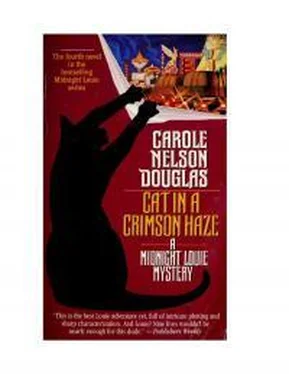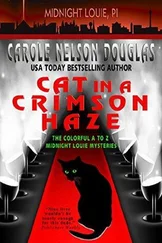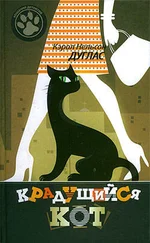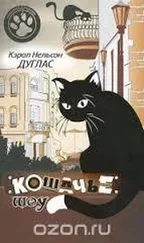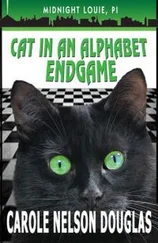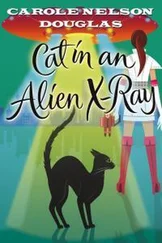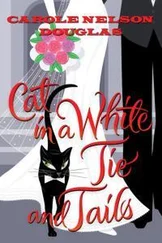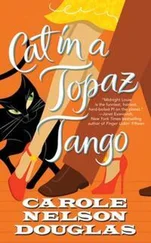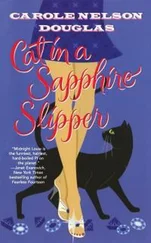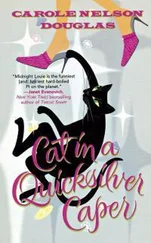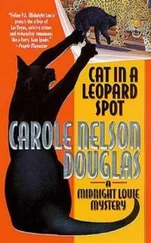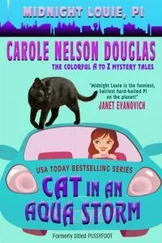''Only in church choirs," he said, too lightly.
If Temple could have kicked herself with one of her doffed shoes she would have. She had attended a Catholic mass only once in her life, for a cousin's wedding. The priest had intoned--
sang--several parts of it. Of course Matt sang; it once was a career requirement.
Now Lieutenant Molina--or her surprising alter ego. Carmen--was singing again.
And now that they knew exactly who was providing the restaurant background music.
Temple and Matt found themselves glued to their chairs like good little kids: hands folded, heads attentively tilted, unable to look away from the stage or say a single discouraging word to each other.
Their food finally arrived, providing a distraction they dove into with knife and fork as if the harmless stainless steel utensils were hammer and tong.
In fact, Molina's sardonic "Enjoy yourselves" had created the reverse effect.
"It's blue murder," Temple muttered after dismembering her fried catfish fillet, "to discover you know the performer you're ignoring. And even harder to ignore her once you know who she is."
"It's especially hard when you know she's a homicide lieutenant," Matt added, attacking a pair of pork chops as if they were renegade wild pigs.
By eating only half their servings and foregoing dessert, they were ready to leave in twenty minutes flat.
By then a lot of diners were paying attention to Molina and her music. She perched on a stool at center spotlight, where the over bright light faded her skin into a luminous mask. Only her Joan Crawford eyebrows and maroon mouth stood out: dark, well-defined, like the empty features in a mask of tragedy.
Carmen Molina had launched into the lengthy Cole Porter masterpiece, ''Begin the Beguine,'' so they were stuck for an-other ten minutes.
When Matt whispered to the waitress for the check, Temple piped up, ''A doggy bag, please.
For the cat."
She was soon delicately flicking fish flakes and pork into a hinged styrofoam box in time to Molina's tempestuous tango beat while the lieutenant moaned about nights of ''tropical splendor'' and a lost love "evergreen."
"It used to be one of my favorite songs," Temple hissed to Matt.
He looked sympathetic. "And this--Molina--has ruined it for you?"
"Her and somebody else." Temple watched Matt lay two twenty dollar bills on the tray bearing the bill. No credit card. Yet. Why hadn't she seen all these signs sooner? Lord, he could have been an escaped convict and she'd have never noticed.
When his change came, Temple insisted on leaving the tip. Then they left, bumbling in the way that aims at being super-quiet but makes a spectacle of itself instead. As they exited the restaurant, surrounding diners clapped enthusiastically. Molina's dark head bowed repeatedly in the spotlight, so it looked like the damn silk orchid over her ear was blowin' in the wind. Another ex-favorite song after tonight. Temple thought sourly.
Outside, the sun had blown town and the dark felt like a cool chiffon curtain. The Strip was far enough away that they could look up and see the big desert stars without any neon competition. Temple couldn't even hear the roar of the Mirage volcano.
Autumn was coming, and nights toyed with growing chill. She rubbed her hands up and down her bare forearms, feeling goose bumps. The night felt fresh. Senses sharpened now that the heat was withdrawing from the pavement beneath their feet like fever from a healing patient. Out in the desert, night life of another sort than the Strip's frenetic pace would be stirring, scuttling. Here, on the fringes, the city of Las Vegas was quiet for a change, keeping decent hours. Only nine p.m.
They walked around the free-standing building, smiling at its neon frills, to the side parking area. It wasn't easy to find Temple's low-profile Storm among a lot crammed with alien cars that had arrived since they came.
"Popular place," she commented.
Matt looked thoughtful." Maybe--"
"I know. Maybe Molina's the drawing card. But you heard her: nobody knows when she's going to show up."
"That's a terrific trait in a police officer. Maybe in a singer, too."
Temple shook her head and pulled the loose-woven shawl she carried over her shoulders.
"When you know what she does for a living, it colors the show. I thought I'd die when she launched into 'Someone to Watch Over Me.' "
Matt laughed. ''Me, too. I mean, here I am asking you how to get information out of unwilling witnesses. And, not twenty feet away, there's the city's top homicide cop in eavesdropping distance--only she's singing her lungs out."
"Well, she's 'a' homicide cop. I don't know if she's 'the top' homicide cop."
"The top homicide cop we know. And then when she sang 'The Man that Got Away'--"
Temple started laughing and couldn't stop. She laughed so hard that she nearly dropped her doggie carton. "Holy Guacamole! Louie would kill me if this stuff went 'splat.' 'The Man that Got Away,' please! Oh, God, do you suppose she . . . she . . . dedicated it to Max?"
Matt was laughing harder than she was now, leaning against the car's aqua side, his elbows on its now-cool roof. "Max?"
Temple lurched against the car's fender, crushing her straw handbag between herself and hard metal, barely able to talk. She nodded, controlled her laughter for a few instants before it came bubbling out again with her words. "Max. Molina--"A whole glissando of guffaws."--
wants to, to interrogate him--" Temple almost slid along the fender to the asphalt, she was laughing so intensely'' --in the worst way! Oh, my side ... I think I--"
''Stop it! "Matt commanded between his own sputters of hilarity. ''We could . . . could hurt ourselves laughing like this after a big dinner.''
"What big dinner?" Temple squeezed out, doubled over. Tears showered her face. "We were so shook up we could hardly eat a ... a bite.''
"Yeah, Molina really put the collar on our . . . appetites."
They both went off again, laughing uncontrollably. "Maybe," Temple sputtered. "Maybe she could sing at Weight Watchers meetings!"
Everything they said, everything they thought, seemed hysterically funny. They laughed until it hurt, and until they couldn't stop even though it hurt. They still laughed when they had run out of words. Just an assessing glance, to see if the other had sobered up, so to speak, sent the assessor off to Ha-Ha Land again.
Temple finally shook her head, wiping away tears with her bare hands. Matt pulled himself upright, away from the car, like a man trying to shake off a drunk. He offered her a plain white linen handkerchief. Who carried handkerchiefs nowadays, she wondered--except maybe funeral directors? And priests.
"Nothing we said was really that funny," Matt pointed out.
Temple nodded agreement, wiping her face with die harsh linen, clutching her shawl, her purse, her carton. The occasional trill of laughter still broke free without warning, like a hiccup.
"I guess you had to have been there." she said, "and unfortunately--we were!"
They laughed again, an exhausted emotional eddy of self-circling sounds that faded into breathy coughing, some disciplinary lip-biting and finally rueful smiles.
Matt shook his head. "It's not my night."
"Nor mine. Listen, Matt." Temple tried real hard to get serious, because what she had to say was serious. "What you were asking me in there is important. I hate to preach at you, but if you take on the task of finding out something other people don't know, of pumping people who may not want to tell you something, or who don't know what you're really after, you've got to have a
... an ethic."
He nodded. Ethics he understood instantly.
"I may seem simply nosy to you, but I used to work as a TV news reporter. Maybe this isn't news to you, but all our institutions--governmental bureaucracy, corporate leaders, the church--" she added pointedly "--they all operate on a 'need-to-know' basis, just like the spy guys at the CIA, or something. They figure that we--the citizen, the consumer, the client, the public--don't need to know the inside scoop, the motive, opportunity and the real reasons.
Читать дальше
